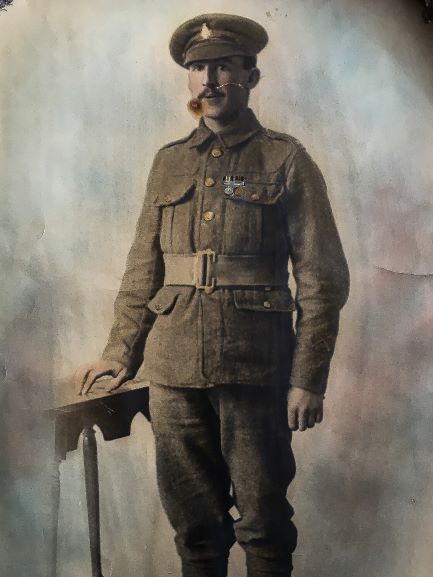
Information submitted by Lynne Pengelly.
Thomas William Tidyman known as Bill (although this may have only been after he moved to Bradford)
Born 1st November 1896 in Norton, Stockton on Tees the 2nd child, eldest son of John and Mary Tidyman
The 1911 census shows him living and working on a farm in Agglethorpe (possibly Brecongill) with his parents and 6 siblings, his older sister is listed as a diarymaid.
He enlisted on 24th May 1918 at the age of 23 into the 9th battalion of the Yorkshire Regiment and was wounded by a gunshot in his right forearm sometime in September 1918, he was transferred to the Bangour War hospital in Edinburgh and was discharged on 19th June 1919.
Carl at the Green Howard’s museum was able to tell me that my grandad had been a marksman when he saw the badge on his uniform and also explained about the silver war badge given to injured men to wear after they had been discharged as unfit for further war service.
After the war he returned to the farm his father died in 1920 and his mother died in 1927, at sometime he met my grandma who was visiting some friends who had relocated to Coverdale and they were married in Bradford on 7th December 1929.
He was a tenant farmer at Harrop Edge Farm in Allerton Bradford until 1942 and then the family moved to Allerton village and he had a milk round. He worked for the War Ag during World War 2.
He had several other less manual jobs until his retirement in 1961 and died aged 81 in 1979.
Explore more memories from the ribbon
-
Clement Rose
Clement Rose was the son of John and Mary Rose of Monkwearmouth, Sunderland. His father was a mast-maker. He enlisted in the East Yorkshire Regiment in October 1914 at the age of 17. His elder brother was serving with the Yorkshire Regiment and claimed Clement for them. The 8th Battalion left for France in late August 1915 and on October 11th they relieved the 11th Sherwood Foresters Regiment in trenches at Rue Marles. 15734 Private Clement Rose was killed in action on the 13th, one of the 8th Battalions first casualties. He was buried at Desplanque Farm Cemetery, La Chapelle-D’Armentieres and left his effects to his mother, £2-10s and a gratuity of £3.
-
Captain Thomas Ernest Dufty
Captain Thomas Ernest Dufty 5th Battalion Yorkshire Regiment Captain Dufty was born in on the 30th of June 1880. His father was Arthur Richard Sykes Dufty and his mother was called Katie. He was educated at Pocklington Grammar School. He joined the 5th Battalion in 1912 and became a lieutenant in June 1913. Prior to this his profession was as a banker and manager of the Bridlington branch of the London Joint Stock Bank. Dufty was promoted to Captain on the 18th of April 1915. He was reported as killed in action on or about the 19th of May 1915 (killed by a shell). His Battalion had been deployed to Sanctuary Wood (1.9 miles east of Ypres). He left a widow, Beatrice, and a 4-year-old son Arthur Richard. He is buried at the Vlamertinghe Military Cemetery in Belgium and commemorated at the Manor Road Cemetery Scarborough.
-
Reginald Howes
Ruth Kendon came into the museum and told us the story of her father, Reginald Howes. Reginald Howes (1889-1977) attended the University of London Officer Training Corps (OTC) between 6 May 1915 and 20 July 1916 before being commissioned as a 2nd Lieutenant in the Yorkshire Regiment on 21 July 1916. He served with the 4th Battalion as temporary Adjutant and Intelligence Officer, and was wounded on 15 September 1916 at Kemmel, just south of Ypres. Ruth remembers him saying he was wounded on the day tanks were first used. Howes was awarded the Military Cross in March 1918, for “conspicuous gallantry and devotion to duty” on the Somme, during the Kaiserschlacht offensive and promoted to Captain the following month. He was taken prisoner on 27 May 1918 and released on 14 December 1918. Ruth kindly donated a number of items which belonged to her father to the museum for safekeeping.
